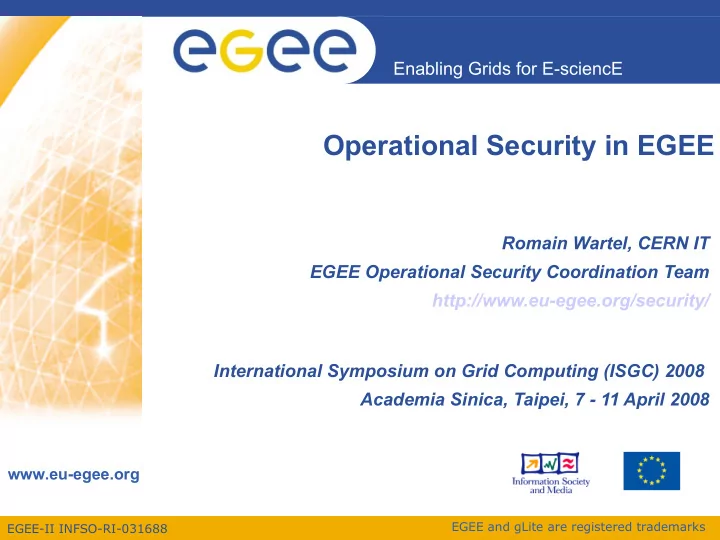

Enabling Grids for E-sciencE Operational Security in EGEE Romain Wartel, CERN IT EGEE Operational Security Coordination Team http://www.eu-egee.org/security/ International Symposium on Grid Computing (ISGC) 2008 Academia Sinica, Taipei, 7 - 11 April 2008 www.eu-egee.org EGEE-II INFSO-RI-031688 EGEE and gLite are registered trademarks
Computer security incident Enabling Grids for E-sciencE • What is a “Security Incident”? A security incident is the act of violating an explicit or implied security policy • What can motivate attackers? – Money (and little risk of being caught) – Less likely: political motivation, challenge, ego, fame, etc. • How do attackers often proceed? – Most attacks are partly/fully automated – First find an entry point (weak network service, stolen credentials, etc.) – Install necessary toolkit to maintain a 'quiet' access – Implant payload (DDOS, Botnet, SPAM engine, etc.) – Harvest additional credentials INFSO-RI-508833 2
Money, money, money Enabling Grids for E-sciencE http://rbnexploit.blogspot.com/2007/11/rbn-76-service-team-loads-cc-and-their.html INFSO-RI-508833 3
Security Incidents Statistics Enabling Grids for E-sciencE INFSO-RI-508833 4
Top risks for the grid Enabling Grids for E-sciencE • Attacks against other sites (ex: DDoS) • Storage, distribution or sharing of illegal/inappropriate material • Disruption of service, damage to user data This can involve: • Damage to the project/sites reputation • Legal/financial actions against participants http://proj-lcg-security.web.cern.ch/proj-lcg-security/RiskAnalysis/risk.html INFSO-RI-508833 5
EGEE Security groups Enabling Grids for E-sciencE Middleware Grid vulnerabilities Common Architecture Security Policies for Framework Vulnerability Grids Interoperability Group Joint MiddleWare Security Security Policy Group Group Security Coordination Group International Operational Grid Security Trust Coordination Team Federation CSIRT Incident response Trust anchor Dissemination / training CA Monitoring INFSO-RI-508833 6 (Initial picture by Ake Edlund)
Policies Enabling Grids for E-sciencE • JSPG is producing a set of security policies • The following policies have been approved by the EGEE PEB and the WLCG GDB Grid Security Policy (= top level policy) Grid Acceptable Use Policy Grid Site Operations Policy • Site Registration Policy • Audit Requirements Policy • Grid Security Incident Response Policy VO Security Policy • VO Operations Policy • User Registration Policy Approval of Certification Authorities INFSO-RI-508833 7
Incident response coordination Enabling Grids for E-sciencE • ROC Security Contacts are part of the EGEE Operational Security Coordination Team (OSCT) • Incidents coordination: ROC Security Contact on duty Peer OSCT Grids ROC ROC ROC … … Security Security Security Contact Contact Contact Resource Resource Resource Resource … … Centre Centre Centre Centre CSIRT CSIRT CSIRT CSIRT INFSO-RI-508833 8
Security incident prevention Enabling Grids for E-sciencE The EGEE Operational Security Coordination Team has three main activities: • Incident Response improvement – Security service challenges (SSC) SSC1, SSC2, SSC3 (in work) http://cern.ch/grid-deployment/ssc/SSC_2/SSC_2_google.html – IR channels (lists, IM) – IR Scenarios • Incident detection and containment (=monitoring) – Several monitoring tools available to the sites – Central security tests (SAM) • Incident prevention – Best practice ex: https://cic.gridops.org/index.php?section=roc&page=securityissues – Training events INFSO-RI-508833 9
Incident response - coordination Enabling Grids for E-sciencE A large part of the incident response coordination consists in managing the flow of information • The role of the coordinator is to: – Process the available information as soon as possible and follow the most likely leads – Provide accurate information to the sites – Contact and follow up with the relevant CERTs/CSIRTs – Ensure the process does not stall • The objective is to: – Understand what was the vector of attack (ex: entry point) – Ensure the incident is contained – Establish a detailed list of what has been lost (ex: credentials, data) – Take corrective action to prevent re-occurrence INFSO-RI-508833 10
Incident response – main issues Enabling Grids for E-sciencE • Main issues: – It is essential to establish and maintain trust between the sites – Obtain relevant and accurate information and collaboration from all possibly affected sites – Cope with the information flow (large incidents) (during a multi-site incident, the coordinator had to process 500+ incoming emails during the first 5 days, including 280 at day 3) – Redistribute the information with an appropriate level of details – Prevent information leaks, which are a serious problem. They can discourage other sites from sharing their findings in the future and expose sensitive information (personal details, etc.) INFSO-RI-508833 11
SSC3 – Early results Enabling Grids for E-sciencE INFSO-RI-508833 12
Conclusion Enabling Grids for E-sciencE • Training and dissemination requires significant efforts, as it is difficult to improve security practices at the sites • Tests (security service challenges) are extremely useful • Increased expertise in the team to manage multi-sites security incidents • Need to build and maintain trust between the participants • Cooperation and sharing with peer grids (ex: OSG) and with other involved parties (ex: NRENs) is essential INFSO-RI-508833 13
Enabling Grids for E-sciencE Discussion www.eu-egee.org EGEE-II INFSO-RI-031688 EGEE and gLite are registered trademarks
Recommend
More recommend